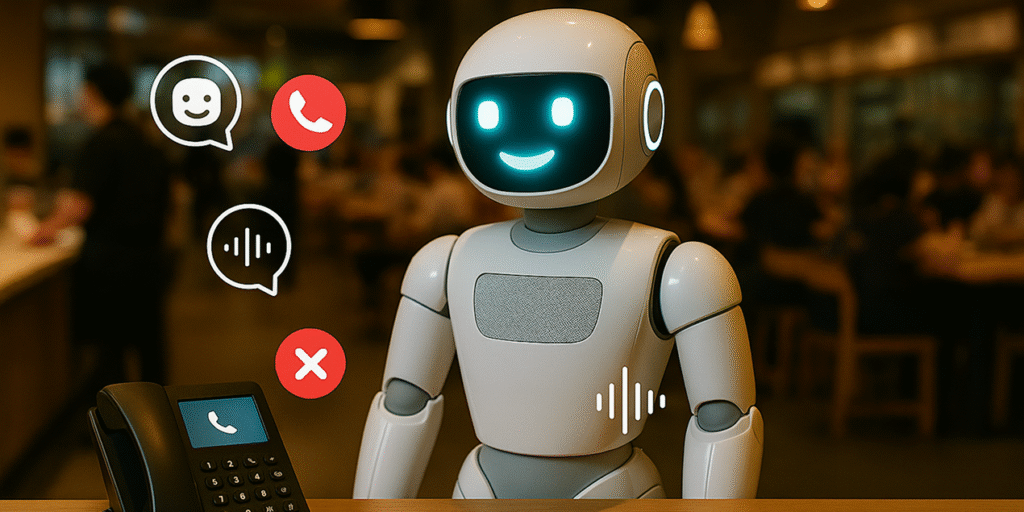It’s hard to run a restaurant. From staff management and customer service to order taking and marketing, every aspect counts. But there’s one issue most restaurants fail to consider: missed calls.
And believe it or not, those missed calls are silently eating into your revenue.
What is it that missed calls are really costing your business, and how can AI voice assistants resolve it before more profits disappear?
The Real Price of Missed Calls in the Restaurant Industry
When business is brisk, the phone often goes unanswered. Perhaps the staff is slammed with in-house diners, or a delivery just went out. But what appears to be a minor problem is really a major revenue drain.
1. Every Missed Call = Missed Opportunity
Many customers call to:
- Reserve a table
- Place a takeaway order
- Ask about the menu or hours
When you do miss one of those calls, there’s a decent chance they’re just going to call another restaurant.” It’s quite a direct loss of sales, particularly for group bookings or big food orders.
2. Bad First Impressions
If a potential new customer’s first point of contact with your brand is a call that goes unanswered, they may never give you a second chance. It ruins your reputation before you’ve even had a chance to serve them.
3. Negative Online Reviews
Angry customers frequently take to the internet to vent. “3 calls, no answer.” Such reviews live forever and can send prospective customers away.
4. Marketing Budget Wasted
In ads or social media promotions, you may be investing in food delivery apps. But if a customer spots one of your advertisements and tries calling — only to get nothing but the sound of crickets with a ringtone and an unreturned call — all your marketing is for naught.
5. Overloaded Staff
Frontline staff are multitasking seating guests, taking orders for dining in, handling payment. You can’t reasonably expect them to take phone calls during rush times. It all causes stress, errors and other calls that are missed.
How AI Voice Assistants Solve the Missed Call Problem
This is where the age of AI voice assistants is a game-changer for restaurants.
Imagine it as if you’d hired the absolute best receptionist — one who never falls asleep, never gets bored (unless your calls are boring), and treats every single person who calls with politeness, professionalism and panache, 24 hours, seven days a week.
This is how AI voice assistants assist the restaurants in curbing the missed call phenomenon:
1. Answers Every Call Instantly
While human staff may be busy waiting tables, or juggling kitchen tasks, an AI voice assistant never forgets to pick up the phone.
All calls are answered on first ring, and no caller is ever left holding or sent to voice mailbox.
It’s a quick response that saves customers who would have otherwise hung up and called a competitor. Whether it’s lunch or the dark of night, your AI receptionist is always ready.
2. Works 24/7 Without Breaks
AI doesn’t require lunch breaks, weekends or sleep. It has 24/7 operating hours and is ideal for:
- Taking late-night food orders
- Managing early morning table bookings
- Help during peak hour when tasks are high.
With this availability, restaurants can answer the phone at all times, even outside of their hours, capturing those lost orders or reservations.India (and many other countries) have a diverse customer base. Not every customer will speak English fluently.
3. Speaks Multiple Languages
India (and many other countries) have a diverse customer base. Not every customer will speak English fluently.
An AI voice assistant can be taught to communicate in many different languages, for instance:
- English
- Hindi
- Gujarati
- Tamil
- Marathi
And more
This is so that every customers feel at ease and at home regardless of the language they choose to engage in. It eliminates language barriers and enhances customer satisfaction.
4. Handles Common Queries and Orders Automatically
Most restaurant calls are repetitive.
“Are you open today?”
“What’s the menu for tonight?”
“Do you take reservations?”
“May I get an order of butter paneer and a naan for pickup?”
Rather than requiring human staff time, a AI assistant can be taught to:
- Share operating hours
- Provide real-time menu details
- Handle table bookings
- Accept takeaway and delivery orders
- Answer FAQs about offers, pricing, and services
It frees up your team to focus on in-house guests while the AI handles phone inquiries smoothly and accurately.
5. Call Tracking and Insights
Every call is recorded and logged. It can produce reports which indicate:
- Peak call times
- Most frequently asked questions
- Missed opportunities
- Customer behavior patterns
This data can be useful to restaurant owners to make operation improvements, upgrade menus, organize staff schedules, and launch more effective promotions directed at real customer needs
If your phone rings but no one answers — that’s not merely background noise. That’s money falling through the cracks.
Missed calls are missed sales.
It’s official: AI voice assistants are now passé. They’re the thinking person’s answer to a very real problem today.
Whether you’re a high-end bistro or a fast food establishment, using an AI-enabled call-handling system can save time, keep customers and increase business.
So, if you’re tired of missed calls hurting your restaurant business—maybe it’s time to let AI answer.

